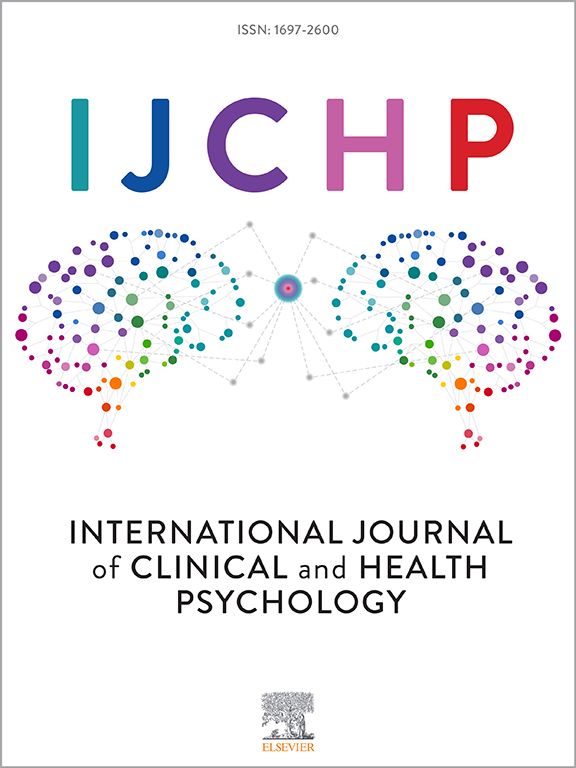Virtual individual cognitive stimulation therapy (V-iCST): Mixed methods feasibility randomised controlled trial
IF 5.3
1区 心理学
Q1 PSYCHOLOGY, CLINICAL
International Journal of Clinical and Health Psychology
Pub Date : 2024-10-01
DOI:10.1016/j.ijchp.2024.100523
引用次数: 0
Abstract
Objective
Cognitive Stimulation Therapy (CST) is a dementia intervention shown to improve cognition and quality of life (QoL). Previous research on individual CST delivered by family carers showed no significant improvements in people with dementia. We aimed to evaluate the feasibility and acceptability of Virtual Individual Cognitive Stimulation Therapy (V-iCST) delivered by healthcare personnel.
Methods
Mixed methods feasibility randomised controlled trial. Thirty-four participants were randomly allocated to either 14 sessions of twice-weekly V-iCST (n = 17) or treatment as usual (n = 17) delivered over seven weeks. We assessed cognition, QoL, communication, and depressive symptoms pre/post-treatment. We conducted semi-structured qualitative interviews with participants and carers (n = 15) following V-iCST, analysed with thematic analysis.
Results
High levels of attendance, adherence, completion of outcomes, and moderate fidelity. There were no significant between-group changes, but there was a positive trend in cognition. Qualitative findings suggested that V-iCST was valued and convenient but can evoke negative emotions.
Conclusions
V-iCST was feasible and acceptable. Preliminary data indicate that V-iCST delivered by healthcare personnel might meet a critical gap through increasing access to those who cannot or prefer not to attend in-person CST/groups. The need for remote treatments and CST being the main psychosocial intervention emphasizes the need for definitive trial.
虚拟个人认知刺激疗法(V-iCST):混合方法可行性随机对照试验
目的认知刺激疗法(CST)是一种痴呆症干预措施,被证明可以改善认知能力和生活质量(QoL)。以前关于由家庭照顾者提供个人 CST 的研究表明,该疗法对痴呆症患者没有明显改善。我们旨在评估由医护人员提供的虚拟个体认知刺激疗法(V-iCST)的可行性和可接受性。34名参与者被随机分配到为期七周、每周两次、每次14节的V-iCST治疗(17人)或常规治疗(17人)中。我们对治疗前后的认知、QoL、沟通和抑郁症状进行了评估。在 V-iCST 结束后,我们对参与者和照护者(n = 15)进行了半结构化定性访谈,并进行了主题分析。组间变化不明显,但认知能力呈积极趋势。定性研究结果表明,V-iCST 既有价值又方便,但会引起负面情绪。初步数据表明,由医护人员提供的 V-iCST 可为那些不能或不愿参加面对面 CST/小组的人提供更多机会,从而弥补了这一关键缺口。对远程治疗的需求以及 CST 作为主要的社会心理干预措施,强调了进行最终试验的必要性。
本文章由计算机程序翻译,如有差异,请以英文原文为准。
求助全文
约1分钟内获得全文
求助全文
来源期刊

International Journal of Clinical and Health Psychology
PSYCHOLOGY, CLINICAL-
CiteScore
10.70
自引率
5.70%
发文量
38
审稿时长
33 days
期刊介绍:
The International Journal of Clinical and Health Psychology is dedicated to publishing manuscripts with a strong emphasis on both basic and applied research, encompassing experimental, clinical, and theoretical contributions that advance the fields of Clinical and Health Psychology. With a focus on four core domains—clinical psychology and psychotherapy, psychopathology, health psychology, and clinical neurosciences—the IJCHP seeks to provide a comprehensive platform for scholarly discourse and innovation. The journal accepts Original Articles (empirical studies) and Review Articles. Manuscripts submitted to IJCHP should be original and not previously published or under consideration elsewhere. All signing authors must unanimously agree on the submitted version of the manuscript. By submitting their work, authors agree to transfer their copyrights to the Journal for the duration of the editorial process.
 求助内容:
求助内容: 应助结果提醒方式:
应助结果提醒方式:


